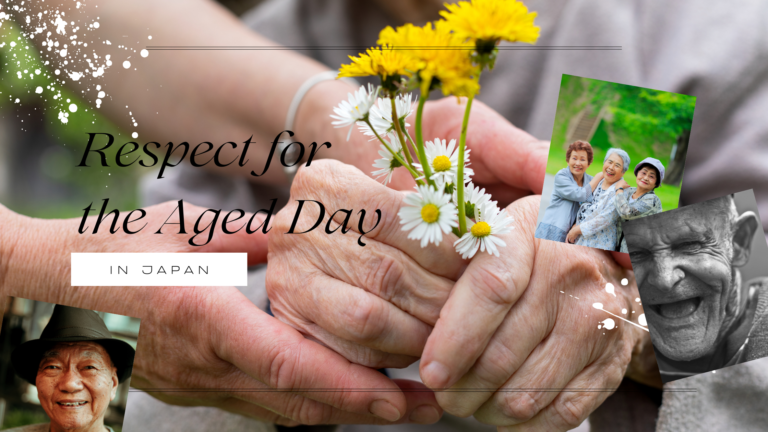Respect for the Aged Day is known as “Keiro no hi” in Japanese.
These days, almost 30 percent of Japan’s population is over 65, and this is the day in which we celebrate the wisest third.
The origins of Respect for the Aged Day
It used to be called “toshiyori no hi”, meaning “old people’s day”, but was changed in 1966. The day was first celebrated in 1947, when a town in Hyogo wanted to promote respect for the elders who had been through multiple world wars in their time.
The mayor of the town invited everyone to a meeting where many elderly residents were gathered. He claimed that the people had much to learn from the seniors, and requested that everyone sit and listen to their stories. This became a tradition which soon spread throughout Japan until it became a more generalised official day of respect.
A quick Japanese lesson
The kanji for “Keiro no hi” is “敬老の日”. This stands for “honour aged day” if you translate it literally.
When is Keiro no hi?
The holiday is held on a Monday every year, this year that will be September 18th, and yes, you do get the day off work.
How do Japanese people celebrate Respect for the Aged Day?
People are usually celebrated on Keiro no hi if they are a grandparent, if they are retired, and/or if they are aged 70+. Since the holiday falls on a Monday, Japanese people usually use the long weekend to travel back to their hometowns to spend time with family.
For those who can’t make it back, they send a gift to their older relatives, such as sweets or alcohol.
On the day, people should celebrate the wisdom and accomplishments of the elderly members of their family, and wish for a long and prosperous life for everyone young or old. Relatives listen to the stories of the senior family members, and reflect on their own lives, and take guidance from the aged.
There are a few customs that they follow:
Gift-Giving: Many people give presents, typically tokens of appreciation or useful items, to their elderly family members or neighbours. These gifts are often accompanied by cards expressing gratitude and well wishes.
Community Gatherings: In many towns and cities across Japan, local communities organize events and gatherings for senior citizens. These events may include cultural performances, games, and group activities that encourage socialization among the elderly.
Family Reunions: Respect for the Aged Day is a time for families to come together and spend quality time with their elderly relatives. It’s common for families to organize special meals or outings to celebrate the occasion.
Public Celebrations: Some cities host larger-scale events, such as parades or concerts, to celebrate the elderly population and promote intergenerational understanding and respect.
Volunteering: Many young people and volunteers use this day as an opportunity to engage in acts of kindness and service to the elderly. This can include visiting nursing homes, delivering care packages, or simply spending time with seniors who may be isolated.
How can you celebrate the day?
For most of us expats, we do not have grandparents living in Japan with us. Japan is a country with a high percentage of elderly people though, with projections showing that over 40 percent, almost half of the entire country will be over 65 by 2060. This means that there are plenty of elderly people out there for whom you might do a good deed, such as give them flowers, or help them carry something heavy.
You can also reflect on how the older generation has shaped your life, whether personally or by breaking down barriers for you and bringing change to the world. Reach out to your relatives abroad and tell them how much you care for them and appreciate them.
Symbolism associated with the day for the aged
One of the most recognized symbols associated with Respect for the Aged Day is the silver-haired crane. The crane is a symbol of longevity and good fortune in Japanese culture, making it a fitting emblem for this holiday. You’ll often find decorations and gifts featuring images of cranes as part of the celebrations.
We at TLS hope that you enjoy the long weekend. Remember that we are CLOSED this Monday so that all of our teachers can celebrate with their own families. Classes resume from Tuesday.

